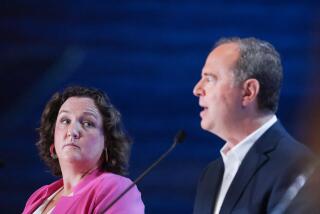Right to Use Secret Political Donation as Ploy Rejected
- Share via
A federal judge on Monday dismissed pro-Israeli activist Michael R. Goland’s bid to assert he had a constitutional right to make anonymous campaign contributions to a minor party candidate to aid the campaign of Sen. Alan Cranston (D-Calif.).
Ruling that Goland’s constitutional challenge was “frivolous,” U.S. District Judge Ronald S. W. Lew also refused Goland’s petition asking the judge to remove himself from the case unless he discloses the name of the candidate he voted for in the 1986 Senate election.
“I certainly have no doubt that I can decide and maintain an appearance of fairness and impartiality without having to divulge who I voted for,” the judge said.
Goland, 41, faces trial this month in U.S. District Court in Los Angeles with two co-defendants on charges that they illegally funneled secret contributions to American Independent Party candidate Edward B. Vallen with the aim of siphoning votes away from Cranston’s Republican opponent, Ed Zschau.
In an unusual civil action filed shortly after the indictment, Goland’s lawyers sought to assert a 1st Amendment right to make anonymous contributions in order to aid another candidate.
“The idea of defeating a major party candidate by getting people to vote for a minor party candidate is not a new concept,” argued Goland’s lawyer, Nathan Lewin. “We say, in circumstances where an individual wants to provide an anonymous contribution to a minor party candidate who has no chance of winning, to defeat a major party candidate, that is constitutionally protected.”
But Assistant U.S. Atty. George Newhouse and an attorney for the Federal Elections Commission argued that there is no way of defining what kinds of candidates have no chance of winning, nor of determining whether an anonymous donor qualifies as a contributor with legitimate interests in remaining unnamed.
“The right Goland sought to exercise was the right to conduct political dirty tricks,” Newhouse argued in court papers. “Whatever else he was trying to accomplish by sabotaging Zschau’s campaign, Goland, the Donald Segretti of the 1980s, was clearly not interested in exercising his 1st Amendment rights.”
Goland’s lawyers said they would seek an emergency ruling from the U.S. 9th Circuit Court of Appeals, delaying the trial, now set for May 16, pending the appeals court’s review of the constitutional issue.
More to Read
Get the L.A. Times Politics newsletter
Deeply reported insights into legislation, politics and policy from Sacramento, Washington and beyond. In your inbox twice per week.
You may occasionally receive promotional content from the Los Angeles Times.










